Talking Azadi on Independence Day
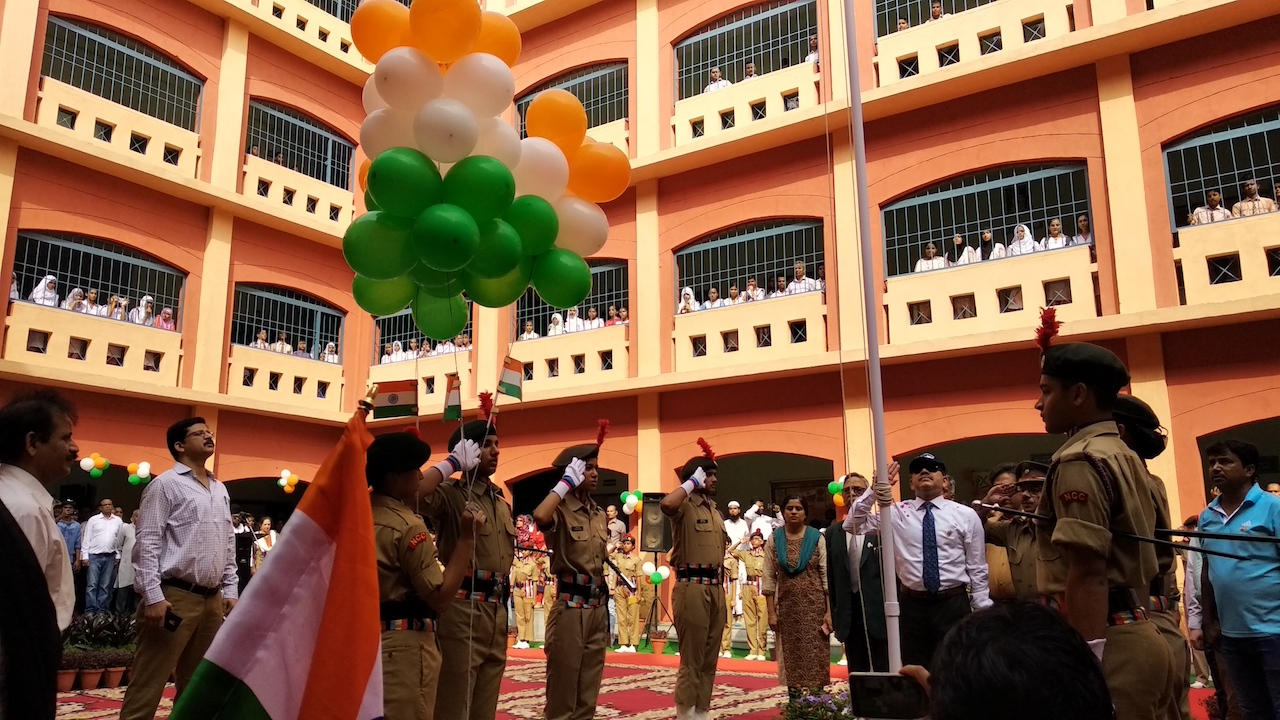
By Afshan Khan and Afroz Alam Sahil, TwoCircles.net
Jabir Ali, a 65-year-old, was reading an Urdu Newspaper near a tea stall at the Batla House Chowk and sipping his tea with a rather serious look on his face. We approached him and asked him if he would talk to us for just five minutes. After he gave his consent, he asked us to sit and after our introduction session ended, we asked him, “what does Azadi (freedom) mean to you?”.
“See for these kids and youngsters, playing DJ and flying kites is all about freedom,” he responds with anguish. When we further enquired him, “How do you experience freedom in your day to day life?”
In response to this question, he paused and queried, “Do you read the newspaper?”
We nodded our heads in agreement. He showed us the newspaper which contained some disturbing news and said, “a riot took place in Moinuddinpur Kanauni village located in Vasundhara, Ghaziabad on Tuesday. Some anti-social elements attacked a place of worship and made allegations that these people tried to kill the cow which was, in reality, an ill cow which had a leg injury.”
“Neither I nor my forefathers had dreamt of this India where human beings are killed in the name of saving an animal. My ancestors had never imagined this time, my father did not join the other country when people were fleeing from India because he had faith in the soil of our nation. We are moving away from the Azadi that we secured from the clutches of the Britishers.” After this comment, he continues flipping through the pages of the newspaper.
Our visit to various localities in the Jamia Nagar region shows how different people have different opinions and expectations when it came to freedom. Sudhanshu Trivedi, a young student leader in conversation with TwoCircles.net shares his thoughts on Azadi. He explains, ‘Azadi means absolute freedom from fear. If I will be free to move in the whole country without having any fear, if me and my friends can eat what we wish to and no one is there on our heads as it is currently happening with the minorities in our country, then only I will feel proud in saying that we are actually free.’
[caption id="attachment_425362" align="alignnone" width="640"]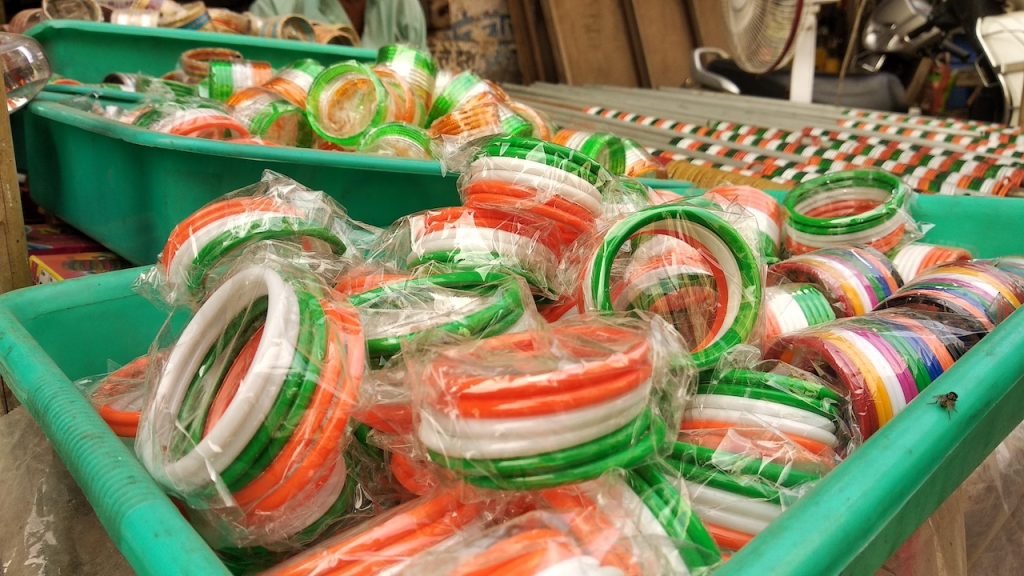 Bangles in tricolor at Batla House[/caption]
Bangles in tricolor at Batla House[/caption]
Uzma (35), who runs a beauty parlour in her house at Ghafoor Nagar, says that she is free and hence she is able to express her views. She is proud of her country and will always be. Her only worries are regarding her daughter’s safety. She expresses her fears by saying, ‘Even after 71 years of independence, our country is not free of sexual harassment. When I travel, I see so many gazing at women, which makes me feel so uncomfortable. The safety of every girl is my concern. In my day to day life, I feel deprived of this freedom.’
Koriam Miraj Shah, a student of M.Phil in North East Centre in Jamia Milia Islamia, belongs to Manipur and is currently living at Jamia Nagar and feels secure in University with everybody’s support. On freedom, he has a different perception of Independence, for him this term is not relevant. According to him, “My people are living in a region which is called a disturbed area under a colonial law called AFSPA. We have been facing the course of systematic oppression which includes rapes, extrajudicial killings, enforced disappearances etc.”
[caption id="attachment_425360" align="alignnone" width="640"]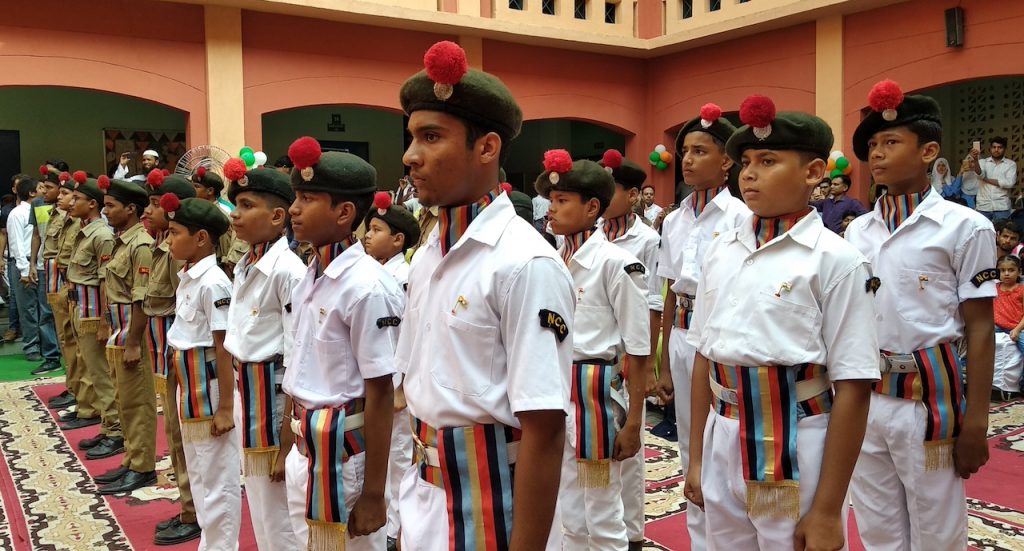 NCC trainees in Independence celebration, Jamia School[/caption]
NCC trainees in Independence celebration, Jamia School[/caption]
He further complains, “people from other parts of India have a completely different perception about us which is far from reality and that is why we are discriminated in day-to-day life. Life is horrible for us outside the University Campus...everyone discriminates against us...from a rickshaw puller to a shopkeeper. Our women are sexualised and questioned over their dressing, there is stereotyping against us as drunkards, party people etc.”
Abida Khatoon (22), is pursuing her PG in Early Childhood Development and wants to be recognised as an independent girl as she believes she has achieved everything to be called empowered but her Azadi is hindered when she feels that people feel pity about her just because she wears a Hijab. “ I was selected for NCC drilling and heavy training camps. I can drive a scooter, bike and car perfectly, and I feel I am empowered but people around me don't feel so. They think of me in the same way they treat other girls who can’t take a decision on their own. I want the acceptance of my hijab from society at large irrespective of any religion and for me, that would be the real Azadi.”, she describes while having a beautiful smile of hope on her face.
[caption id="attachment_425363" align="alignnone" width="640"]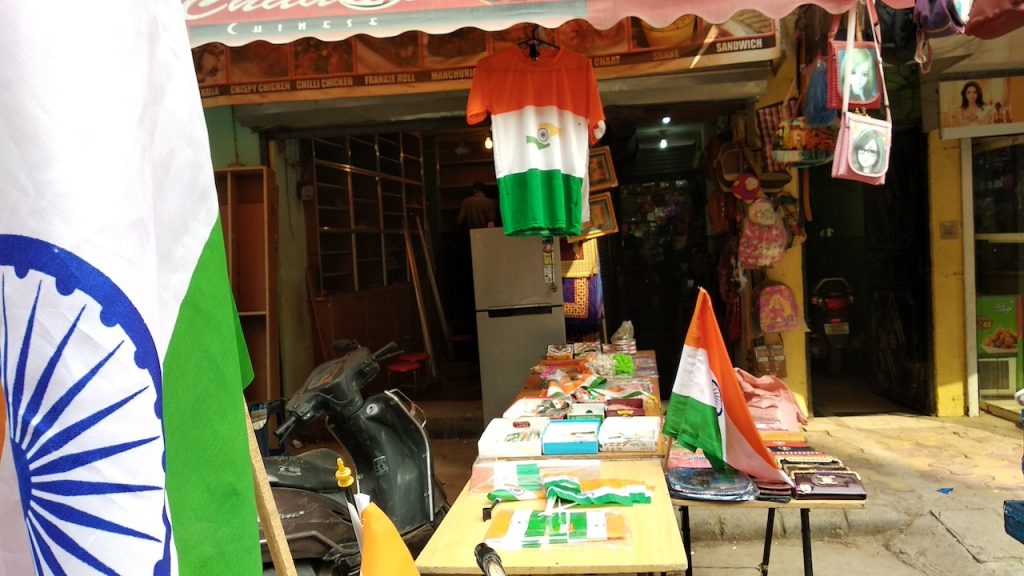 A gift shop displayed and sold tricolour flags and t- shirt[/caption]
A gift shop displayed and sold tricolour flags and t- shirt[/caption]
Nazrul Islam (47), a Rikshaw puller belongs to the Malda district of West Bengal and currently residing at Jamia Nagar. In a conversation with TwoCircles.net, he shares his feelings about the celebration of Independence Day with a satirical laughter, ‘ I only have to pull a rickshaw now after my house was burnt…’. When we asked him the reason behind this mishap, he responds in a hurry as his passenger was waiting, ‘My village had never experienced any Dunga before…’.Nazrul then went ahead with his Rickshaw.
The story of riots in Bengal took us back to the time when riots in West Bengal had occurred in August 1947. Mahatma Gandhi was staying at Beliaghata where Hindus and Muslims lived closely with each other and he stayed in the house of Muslims. He had struggled so hard that he was actually able to bring peace in the land. Addressing the ministers of West Bengal, he had warned, “Beware of power; power corrupts. Do not let yourselves be entrapped by its pomp and pageantry. Remember, you are in office to serve the poor in India’s villages.”. These words of Gandhi have been forgotten by today’s leader of India.
[caption id="attachment_425364" align="alignnone" width="640"]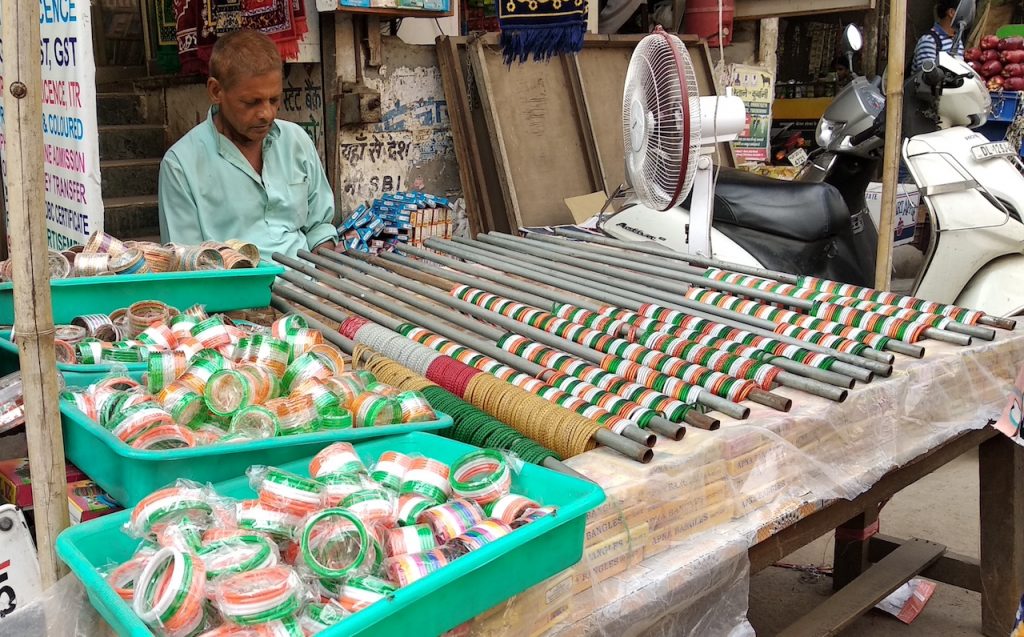 A shopkeeper selling tricolour bangles at Batla House Chowk[/caption]
A shopkeeper selling tricolour bangles at Batla House Chowk[/caption]
We need to learn from Gandhi who, according to everyone at the time of Independence were shocked that how he could bring peace to the communal tensions, when C. Rajagopalachari congratulated him, Gandhi responded by saying that he could not be satisfied until Hindus and Muslims felt safe in one another’s company and returned to their own homes to live as before. Without that change of heart, there was a likelihood of future deterioration in spite of the present enthusiasm.
On the current socio-political scenario of India, his words suit perfectly that it is wrong to molest an Indian citizen merely because he professed a different religion. He advised students to do everything to build up a new State of India which would be everybody’s pride. We need to be foresighted with regard to the demonstration of fraternization, as he said, “I am not lifted off my feet by these demonstrations of joy.”
As we continue to move around Jamia story, we see tricolour kites flying in the shiny clear sky, providing us with the hope that India will reach the zenith whereas, the loud sounds of A.R. Rahman’s song, ‘Jai Ho’ is able to fill the hearts with utmost joy and feeling of patriotism. Love for India is in the air.
